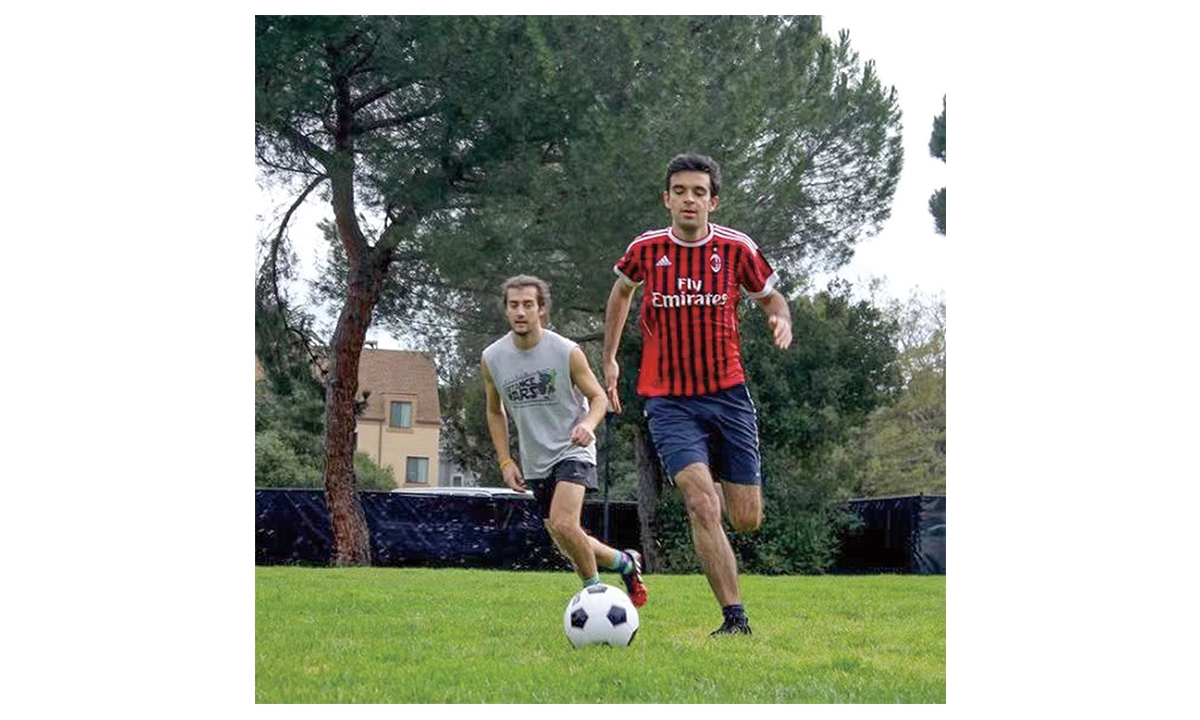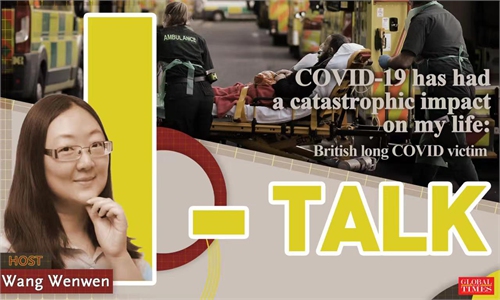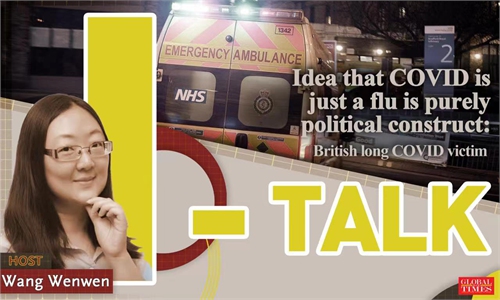Claiming COVID is just a flu and pretending pandemic is over is a political construct: UK long COVID victim
Editor's Note:
People in Western countries believe the COVID-19 pandemic is over, including in the UK, despite the fact that there are 2 million people in that country living with long COVID. Among them is Ravi Veriah Jacques (Veriah Jacques). The 23-year-old young man, who is also the son of well-known British scholar Martin Jacques, has been affected by long COVID for 15 months. Prior to falling ill, he had just graduated from Stanford University and was halfway through a master's degree at Tsinghua University as a Schwarzman Scholar. He has had to spend almost 16 hours a day in bed, and in his own words, the illness feels like "being a prisoner in his own body." In her I-Talk show, Global Times (GT) reporter Wang Wenwen talked to Veriah Jacques about the catastrophic impact long COVID has had on his life, as well as how he thinks the British government has handled the pandemic. Due to his health conditions, the interview had to be taken in two separate parts.
GT: How does it feel when one gets long COVID and how does it affect you?
Veriah Jacques: Long COVID is defined as COVID symptoms at least 1 to 3 months after infection. Long COVID is a multi-system disease, so it impacts many different body systems from the respiratory system to the cardiovascular system and nervous system. This is reflected in the set of symptoms.
Long COVID can involve fatigue. It can involve breathing problems. It can involve quite serious cognitive issues, called brain fog. It can also involve quite some really worrying heart issues. You often lose your sense to smell and taste, and it comes in a real variety of severities. I'm on the slightly more serious end of the spectrum.
The illness has had a pretty catastrophic impact on my life. My main symptom has been this debilitating fatigue that forces me to spend upwards of 16 hours each day in bed. And it prevents me from doing almost any of the things which I used to really enjoy. I can't walk for more than 15 minutes, whereas before I biked 20 miles several times a week. I'm unable to write or read for any particular length of time. I struggle to see friends without feeling more exhausted.
I think it's quite difficult to capture how the fatigue feels to someone who hasn't experienced it. You have this bone-deep exhaustion throughout the day, which doesn't go away with rest. Equally importantly, the fatigue gets worse with exhaustion. If you overdo it, the fatigue can get significantly worse such that you even struggle to walk, struggle to stand up, even going to the toilet can be difficult. And you end up almost being a prisoner in your own body.
Beyond the fatigue, I also have various secondary symptoms which are characteristic of long COVID. I've lost my sense of smell and taste. I have mild tinnitus, and I also have mild gastrointestinal issues.
GT: Before long COVID, did you get fully vaccinated? What vaccine is it?
Veriah Jacques: When I first fell ill, the vaccine hadn't been made available to my age group. I got my first vaccine in about June 2021. And I'm now triple vaccinated with the Pfizer vaccine.
The vaccine reduces the risk of long COVID, I think it's estimated by 15 to 30 percent. But it's important to emphasize that the vaccine is much less effective when it comes to preventing long COVID than preventing death.
In Britain and America, we've recently pursued a vaccine-only strategy. The vaccine has significantly reduced the death toll, but there's been a massive wave of long COVID, even in very highly vaccinated populations.
GT: Which groups are more at risk of developing long COVID?
Veriah Jacques: Anyone can develop long COVID. If you look at me, I was a healthy 22 year old, I biked around, I had a lively life. And I've been knocked out for 15 months. That being said, some people are more at risk than other people. The risk profile for long COVID is very different from COVID itself. Whereas elderly people in terms of age are most likely to die from COVID, middle-aged women are most likely to develop long COVID.
You are also more likely to develop long COVID if you've been more exposed to COVID. In the UK, healthcare workers, teachers and social workers disproportionately have long COVID because their work settings throughout the pandemic had been substantially exposed to the virus.
With long COVID, we're talking about a really serious public health crisis. In the UK, 2 million people currently have long COVID, of whom over 800,000 have been ill for more than a year. Worldwide, a paper recently estimated that around 140 million people have long COVID. This tallies with the studies which have shown that around 15 to 20 percent of COVID infections lead to long COVID. So if you think about the number of people who have been infected globally, it would make sense that tens of millions, hundreds of millions have this quite serious chronic illness. To make matters worse, we currently have no widely available and effective treatments for long COVID. Some people naturally improve over time, but many people are still seriously ill after two years of long COVD. It is therefore essential that governments invest large sums into long COVID research.

Ravi Veriah Jacques Photo: Courtesy of Veriah Jacques
GT: How has the UK government handled the COVID pandemic?
Veriah Jacques: It's been incredibly flawed from the start. You have to return to the start to understand how we got to a state where we've completely given up on any kind of containment.
Early in the pandemic, people attacked China and thought that China had just made a huge mess. They thought that this was a uniquely Chinese problem, when in fact we should have been preparing to contain COVID and we should have been learning from China. Then when COVID arrived in England, we acted far too late. We went into lockdown much later than we should have. That meant that we had to lock down for much longer.
We had this lengthy first lockdown. Then once the lockdown was lifted, all measures went away, and then, of course, cases rise if you get rid of all restrictions. We went into a second really late and lengthy lockdown, and the third late and lengthy lockdown.
You were asking a lot of the population to go into these lengthy lockdowns that weren't actually very effective. A lot of public and political will in terms of containing COVID was lost in that first year and a half. Then once the vaccines emerged, there was a desire to just declare that the pandemic was over.
Now, the Conservative Party has essentially stated its political future on the idea that the pandemic is over. It's no longer about public health. It's almost solely about politics. That's the only way you can explain stuff like: you don't have to mask in hospitals; you don't have to self-isolate if you have COVID. It's a complete abandonment of public health.
This approach completely ignores long COVID. The idea that hundreds of thousands of people are still developing this very debilitating chronic illness completely goes against the idea that COVID is over. But acknowledging that would mean significantly revising the government's strategy. This is why the government has only invested £40 million into long COVID research - because the existence of long COVID is politically inconvenient. We have to believe that COVID is over. It's a very depressing situation.
GT: Omicron is highly contagious. But some believe it is not that dangerous and the symptoms are mild, so we can co-exist with Omicron. What risks do Omicron pose? Is Omicron mild?
Veriah Jacques: In the West, we've decided that the pandemic is over. In Britain, we believe COVID is mild. It's just a flu. The reality is far more complex than that. The idea that COVID is just a flu is almost purely a political construct. That understanding that COVID is mild is based solely on how a healthy young individual will experience Omicron.
It is true that, at the individual level, Omicron post-vaccine is much less to young people than COVID was 2 years ago. You are much less likely to die. You also stand less of a chance of developing long COVID, but there are still 250,000 people in the UK who have long COVID between the ages of 18 and 34.
However, too much of our thinking about the risks of COVID happens at the individual level, when actually the greatest danger Omicron poses is at the societal level. SARS was terrifying at the individual level. It killed 10 to 15 percent of people infected. But it was contained, whereas COVID has unleashed far greater destruction worldwide because it's far more dangerous at the societal level.
When you look at the societal level, COVID and Omicron look nothing like the flu. Omicron is so transmissible. At the height of the Omicron wave in the UK, we were talking about roughly 500,000 infections a day. When you have that many infections, small individual risks multiply up to relatively high numbers.
In the UK at the height of the Omicron wave, we were talking about 300 or 400 deaths a day, in a relatively highly vaccinated population. In the US, where the vaccination rate is lower, you were talking about 2,000 to 4,000 deaths a day, which is really worrying figure. And then there's long COVID. It's always so important to include long COVID in the analysis. So far, about 400,000 people have developed long COVID from Omicron in the UK. So this purportedly mild variant, which led the government declare that the pandemic is over, has caused a really catastrophic wave of chronic illness for which we have no treatment or cure at the moment.
GT: Is long COVID unprecedented? What can we learn about long COVID from other post-viral illnesses?
Veriah Jacques: When I tell people about long COVID, they're really surprised that long COVID is a thing. I think the prevailing popular perception of viruses is that they have two outcomes. You either die or you survive. And there's not much in between, when in fact, post-viral illnesses have always been around. There has always been a large sub-section of people who contract a virus, and then have debilitating long-term symptoms for months, years, even decades.
The most common post-viral illness is called myalgic encephalomyelitis, also known as "chronic fatigue syndrome." M.E. sounds like the name for a rare disease, but in actual fact, it's very common. There are 250,000 people in the UK with it, 1 million people in America. The symptoms are almost identical to long COVD - it's not just fatigue, it's also brain fog, cardiovascular problems, respiratory problems, cognitive problems.
For decades, research into post-viral illnesses has been profoundly underfunded, so there are no effective treatments. Had we found effective treatments, we would almost certainly now have treatments for long COVID. We now have to play catch up for all those decades where we didn't invest in research.
GT: If you didn't have long COVID, you would have become a Schwarzman scholar in Tsinghua University. What's the condition of your academic studies?
Veriah Jacques: When I fell ill, I was two terms into being a Schwarzman scholar at Tsinghua University. I had to do the terms online due to the pandemic. I wasn't able to get to China, which was such a shame because I was desperate to get to Tsinghua and so excited to live in Beijing.
If I had been able to get to China, I probably wouldn't have fallen ill because China has contained COVID so well. I wouldn't have caught COVID and then developed long COVID. I've got one term left at Tsinghua, but I'm waiting till I improve to continue. At the moment, I'm not nearly well enough to continue my studies. I'm focusing mostly on recovery, and I'm also doing long COVID advocacy. I'm writing articles, doing interviews like this, running a support group for young people with long COVID.
GT: How can China help the tens of millions globally with Long COVID?
Veriah Jacques: This has been one of the best side effects of China's containment strategy - that China doesn't have a major long COVID problem.
I think that China has a really important role to play when it comes to long COVID research. And I think it's a role that can benefit China as well. If there comes a point when China is unable to contain COVID, then China will have a major long COVID problem on its hands. I think that China can help mitigate the risks of COVID spreading throughout the society through investing in long COVID research.
We're talking about a country that's now very rich in resources and has world class scientists. If China invests in long COVID research, you could really expedite that research. And that would really have an impact on the global population of people with long COVID. And it could move us much closer to having treatments. So I really hope that China does invest in the research and lends some of its scientists to the challenge.


